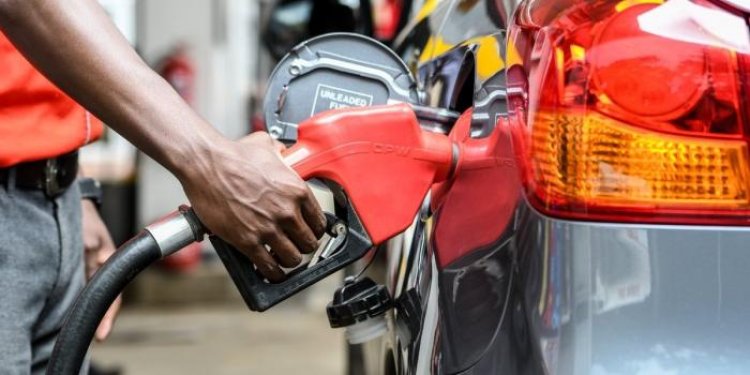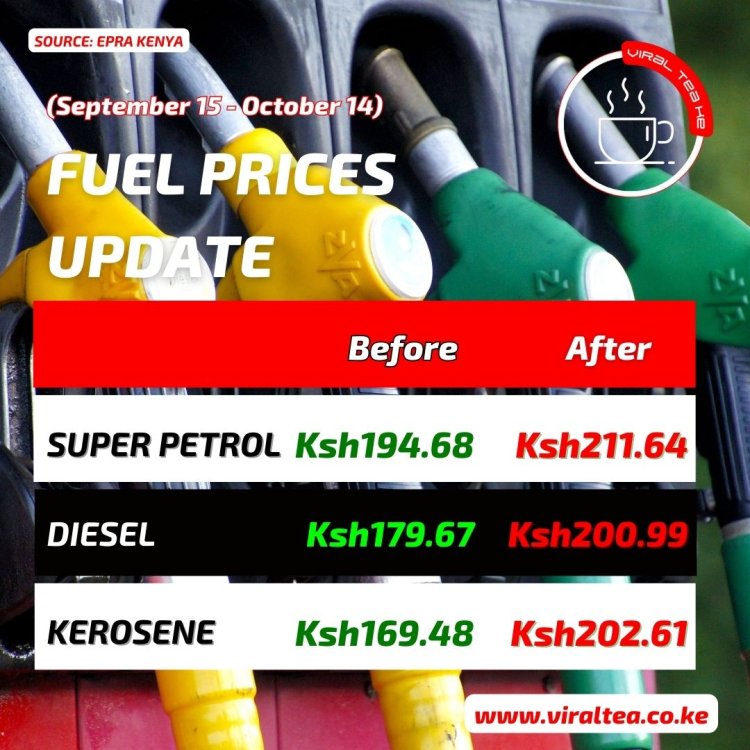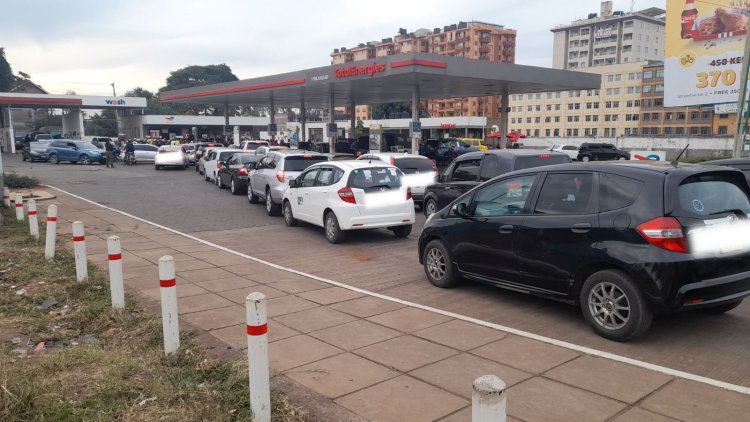EPRA Increases Fuel Prices To Ksh200
In the latest monthly review, the price of Super Petrol, Diesel and Kerosene increased by Ksh16.96 per litre, Ksh21.32 per litre and Ksh33.13 per litre respectively.

The Energy and Petroleum Regulatory Authority (EPRA) has announced the fuel prices for the period between Friday, September 15 and Saturday, October 14.
In the latest monthly review, the price of Super Petrol, Diesel and Kerosene increased by Ksh16.96 per litre, Ksh21.32 per litre and Ksh33.13 per litre respectively.
"EPRA has calculated the maximum retail prices of petroleum products, which will be in force from September 15, 2023, to October 14, 2023
"The maximum allowed petroleum pump prices in Nairobi are as follows: Super Petrol increases by KShs.16.96, Diesel increases by KShs.21.32 per litre and kerosene increases by KShs.33.13 per litre," the statement read in part.

New fuel prices as announced by EPRA on September 14, 2023. /VIRALTEAKE
Super Petrol, Diesel and Kerosene thus retail at Ksh211.64, Ksh200.99 and Ksh202.61 respectively up from Ksh194.68, Ksh179.67, and Ksh169.48. The new prices take effect at midnight, Friday, September 15.
According to EPRA, the prices are inclusive of the 16 per cent Value Added Tax (VAT) in line with the provisions of the Finance Act 2023, the Tax Laws (Amendment) Act 2020 and the revised rates for excise duty adjusted for inflation as per Legal Notice No. 194 of 2020.
"The average landed cost of imported Super Petrol increased by 4.80% from US$739.21 per cubic metre in July 2023 to US$774.67 per cubic metre in August 2023; Diesel increased by 12.52% from US$701.99 per cubic metre to US$789.89 per cubic metre while Kerosene increased by 19.79% from US$690.58 per cubic metre to US$827.26 per cubic metre," added EPRA.
The regulator explained that the purpose of the Petroleum Pricing Regulations is to cap the retail prices of petroleum products which are already in the country so that importation and other prudently incurred costs are recovered while ensuring reasonable prices to consumers.
"EPRA wishes to assure the public of its continued commitment to the observance of fair competition and protection of the interests of both consumers and investors in the energy and petroleum sectors," assured the regulator.
Elsewhere in Mombasa, motorists will have to pay Ksh208.58 for Super Petrol, Ksh197.93 for Diesel and Ksh199.54 for Kerosene, all per litre, with Diesel and Kerosene users getting a slight reprieve.
Motorists in Nakuru will pay Ksh210.63 for Super Petrol, Ksh200.40 for Diesel and Ksh202.01 for Kerosene while those in Eldoret will pay Ksh211.40 for Super Petrol, Ksh201.17 for Diesel and Ksh202.77 for Kerosene.
In Kisumu, motorists will pay Ksh211.40 for Super Petrol, Ksh201.16 for Diesel and Ksh202.77 for Kerosene.
The government introduced a subsidy of Ksh7.33, Ksh3.59, and Ksh5.74 per litre of Super Petrol, Diesel, and Kerosene respectively.
It is important to note that Kenya imports all its petroleum product requirements in refined form, which makes the country susceptible to fluctuations in global oil prices and international market dynamics. These price increases come at a time when Kenyans are already grappling with the rising cost of living, including soaring food prices and increased electricity tariffs.
Fears of fuel prices crossing the Ksh200 mark began after Members of Parliament (MP) on Wednesday, June 21 approved the increase of fuel's Value Added Tax (VAT) from 8 per cent to 16 per cent.
On Friday, June 30 however, Kenyans' fears were spared temporarily when Super Petrol increased to Ksh195.53 per litre, Diesel Ksh179.67 and Kerosene Ksh173.44 per litre in Nairobi, hovering just below the dreaded Ksh200 mark.
The latest increase, which is now the highest in Kenya's history, has sparked mixed reactions on social media, with consumers expressing concern about how the new prices could affect their budgets more adversely.
Usually, the change in fuel prices is a ripple effect, with any increase in fuel prices triggering possible increases in the cost of matatu fares, food, transportation and power generation operational costs, which include the transportation and logistics sectors, which are vital for the distribution of goods across the country.
As Kenyans prepare for these new fuel prices to take effect, there is growing anticipation for the government to implement measures to cushion vulnerable segments of the population from the adverse effects of the high cost of living.


 admin
admin 




